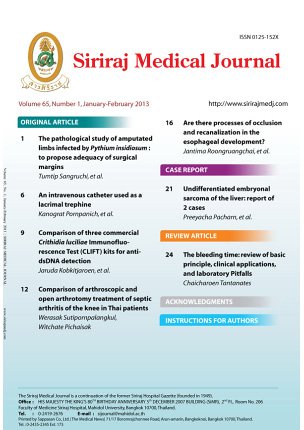Comparison of Three Commercial Crithidia luciliae Immunofluorescence Test (CLIFT) Kits for Anti-dsDNA Detection
Keywords:
Crithidia luciliae, immunofluorescence testAbstract
The Crithidia luciliae immunofluorescence test (CLIFT) is widely used in clinical laboratories for anti-double stranded DNA (anti-dsDNA) detection. It has comparable sensitivity and specificity to the standard method, Farr assay, but employs simpler and safer techniques. A number of CLIFT kits are commercially available. We evaluated the sensitivities
and specificities of three commercial CLIFT kits, including IMTEC, Hemagen and Euroimmun. The IMTEC kit detected IgG, IgM and IgA classes, while the Hemagen and Euroimmun kits detected only the IgG class. Farr assays were performed when three kits gave discrepant results. The gold standard methods were the consensus results of all three kits together with the Farr assay. Out of one-hundred and thirty sera, 111 sera (85%) gave concordant results by all three CLIFT kits and 19 sera (15%) gave discrepant results. Sensitivities and specificities of the IMTEC, Hemagen and Euroimmun kits were 97.4% and 94.5%, 66.7% and 100%, and 89.7% and 94.5%, respectively. The size of the IMTEC C. luciliae was smaller than those of the other two kits, leading to more difficulty in slide reading. Factors affecting the kit’s performance may include substrate preparation and immunoglobulin class detection.
Downloads
Published
How to Cite
Issue
Section
License
Authors who publish with this journal agree to the following conditions:
Copyright Transfer
In submitting a manuscript, the authors acknowledge that the work will become the copyrighted property of Siriraj Medical Journal upon publication.
License
Articles are licensed under a Creative Commons Attribution-NonCommercial-NoDerivatives 4.0 International License (CC BY-NC-ND 4.0). This license allows for the sharing of the work for non-commercial purposes with proper attribution to the authors and the journal. However, it does not permit modifications or the creation of derivative works.
Sharing and Access
Authors are encouraged to share their article on their personal or institutional websites and through other non-commercial platforms. Doing so can increase readership and citations.











